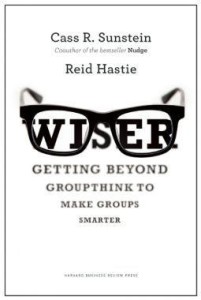Groupthink. Aren’t two heads better than one? Three, four, five, well . . . how about wisdom of the crowds? If hundreds believe it is a good idea to jump into social media marketing, it must be good. Not necessarily. Why? That is what Wiser is about. The book gives you enough reasons to open your eyes to the various biases that groups and crowds fall prey to.
Do you ruminate over your problems alone and try to look at the problem from all possible angles? Or do you go to a trusted few to get their opinions before you have formed one? Multiple opinions are helpful, but not always. In fact, group deliberation is good only if certain conditions are met and the deliberations are conducted in a specific way.
That is what Cass R. Sunstein and Reid Hastie argue in Wiser: Getting Beyond Groupthink to Make Groups Smarter. In this book the authors investigate if it is really wise to involve groups in decision making. They show that group deliberations are inherently tuned to fail. Unless the convener takes care, the decisions taken in groups will most probably be inaccurate and doomed to fail.
Wiser: Getting Beyond Groupthink to Make Groups Smarter
Authors: by Cass R. Sunstein, Reid Hastie
Publisher: Harvard Business Review Press (December 23, 2014)
Pages: 176
ISBN-10: 1422122999, 978-1422122990
Wiser: Getting Beyond Groupthink to Make Groups Smarter takes a close look at group behavior on the outcome of group decisions. There are various factors that influence the way groups discuss problems and issues and the path they take in their deliberations. One of the most obvious and common problems of conducting group deliberations in public offices and corporate meeting rooms is the position of the convener of the discussion. Hierarchy bears a strong influence on the outcome here when you have the department head conducting the meeting with her subordinates.
Similarly, when the workplace environment is primed to punish dissent and opposing views – ‘if you are not part of the solution, you are part of the problem’ – the participants desist from airing what they really feel and take the most popular opinion and avoid poking holes in the argument. This often leads to ignoring some serious shortfalls in the argument.
Throughout the book, authors explain and show various groupthink scenarios that are poised to fail and the reasons why they fail. The psychological reasons behind how these biases work help the reader examine their experiences in such deliberations and equips them to conduct think-tank discussions that will be fruitful.
But power or position of the speaker is not the only reason why the group discussion might be skewed. It also depends on the overall strength of the information. And strength here does not mean how logical or factual the argument is. As influencer marketing and social media amplification has shown us, the number of people agreeing to a certain view and the influence of these people can easily swing a group’s opinion.
With this investigation in group behavior, the authors offer solution to how you can ensure that the group discussions remain unbiased. One possible approach to reducing bias is to create a group of diverse people who are known to have polarizing opinion on the subject. Similarly, the discussion can be conducted by addressing the issue of the convener. The authors highlight this point when they warn and advise leaders and managers that ‘An agenda that says “Bosses go first” might produce very different outcomes from one that says “subordinates go first.” ‘
After pointing out various biases and scenarios of how groups fail to throw up correct decisions, the authors dive into the factors that help groups succeed in coming up with good decisions, in the second part of the book. Here, the authors discuss various methods such as the Delphi Method and Michael Lewis’ Moneyball to shift decision making and some others to move closer to statistical methods. This approach helps the decision making move away from depending solely on intuition and gut feel.
https://www.youtube.com/watch?v=gZ-F26BPQrA
However, all these biases and shortfalls don’t mean that there is no wisdom of crowds. Averages still rule in many cases.
Wiser is a well researched volume on how groups operate. It gives an in-depth analysis of factors that influence how groups reach a certain decision and the various biases at play. While thinking of all these biases can be overwhelming when you sit to start a group deliberation next time, it can help formulate a plan to reach correct decisions. The book is a definite read for leaders and managers who believe that groups come out with better solutions. Wiser provides them with the tools and advice so that they can eliminate these biases and reach a more fitting solution to the problem at hand.